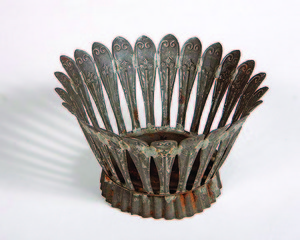

William was an artisan, specifically a tinsmith and coppersmith, making all sorts of high-demand household wares like candle molds, muffineers, pitchers, lanterns, and cheese molds ... or fanciful objects like the basket fashioned from spoons shown here.
German was the preferred language in William Grim's Abingdon home. He was, after all, born of German parents. William was an artisan, specifically a tinsmith and coppersmith, making all sorts of high-demand household wares like candle molds, muffineers, pitchers, lanterns, and cheese molds ... or fanciful objects like the basket fashioned from spoons shown here. It was early 19th century, and essential items for home use were made by hand in local shops. Abingdon had a large community of artisans like William, and most were German living close together in a one-block area of Main Street, just west of the courthouse. They not only lived there but maintained their shops there, too, often in large households that included apprentices to their trades.
The Grim tin shop was long ago replaced by the Episcopal Church parish hall, but it's easy to imagine it there surrounded by neighboring artisans' homes and shops. Located in this busy neighborhood were also silversmiths, blacksmiths, a cabinetmaker, weaver, newspaper editor and a coach factory. The early years of the new century were bustling with newly arrived settlers as well as the artisans who followed them. They were responding to the ready market created by growing towns filled with buying customers, good transportation provided by the Great Wagon Road and abundant natural resources.
Many artisans, like William Grim, were second or third generation German. Like his family, they often came from Germany's Rhineland to settle first in Pennsylvania and then the upper Shenandoah Valley before eventually heading further south and west to what is known today as Southwest Virginia. William is a good example of this migration. He was born during the last decade of the 18th century in the upper Valley in Winchester. He married Susan Nulton, a daughter of another of Frederick County's German families. He and Susan were in Abingdon by 1818, where he was listed in the census records throughout his adult life except for a brief period around 1850 when, near the age of 60, he moved his family, and most likely his business, to Sullivan County, Tenn. William and his family were listed there in the census records for that year, but their fourth child, David, was also included in Abingdon's records, living in the household of other artisans. David Grim at age 21 was following in his father's footsteps and working as a tinsmith, perhaps in two places.
Within a few years, the Grims were all back in Abingdon with father and son in business together. Theirs was a prosperous shop, employing two apprentices in 1870. William died the next year at age 78, his death marked in "A Tribute of Respect," written by the Abingdon Masonic Lodge and printed in the Abingdon Virginian newspaper. David maintained the family business for many more years, stretching into 1910 when, despite the growing trend for factory made goods, he told the population census taker that he was still a "tinner" and still practicing his trade on Main Street.
William and David Grim, "Tinsmiths and Coppersmiths" is adapted from" Backcountry Makers: An Artisan History of Southwest Virginia & Northeast Tennessee." This is the 11th in a series of articles related to this new book by Betsy K. White. Featuring more than 200 color images, it is newly published by the University of Tennessee Press. "Backcountry Makers" is White's second book on the history of the region's material culture. The first, "Great Road Style: the Decorative Arts Legacy of Southwest Virginia & Northeast Tennessee" was published in 2006 by the University of Virginia Press. "Backcountry Makers" is available locally in Abingdon at Zazzy'Z Coffee House & Bookstore and at Heartwood: Southwest Virginia's Artisan Gateway or online from the University of Tennessee Press or Amazon.com.